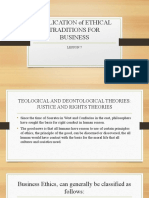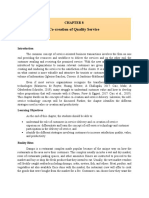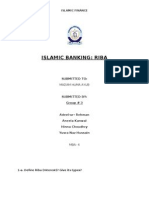Forms of Business Organization
Forms of Business Organization
Uploaded by
Ella SimoneCopyright:
Forms of Business Organization
Forms of Business Organization
Uploaded by
Ella SimoneOriginal Description:
Copyright
Share this document
Did you find this document useful?
Is this content inappropriate?
Copyright:
Forms of Business Organization
Forms of Business Organization
Uploaded by
Ella SimoneCopyright:
FORMS OF BUSINESS ORGANIZATION
The three primary forms of business organization are sole or single-proprietorship, partnership and corporation. SOLE OR SINGLE-PROPRIETORSHIP Businesses which owned by one person is called sole or single-proprietorship. The owner of this business is alternately called sole proprietor, entrepreneur, self-employed, businessman and related title. Those individual practitioners of their chose profession such as lawyers, doctors, CPAs, engineers and other professional also belongs to this form of entity. To establish a single proprietorship business is to register at the Department of Trade and Industry (DTI). Advantages Disadvantages
liable for all the business debts and obligations. Owners resources are limited (capital, skills, etc) All the losses are borne by the owner. Limited life the business is automatically ceases when the owner is dead or imprisoned or became insane.
Easiest to set-up only few legal requirements is Unlimited liability the owner is the one legally
needed to form the business. Only one person decides for the business, the owner. All the profits are goes to the owner. Not the business but the owner is the one taxed. Easy to dissolve.
PARTNERSHIP The entity is said to be a partnership when the business is formed by two or more person who agreed to contribute money, property, industry and intelligence to a common fund with the intention of dividing the profits among themselves. The owners are called partners. A partnership business is registered at Securities and Exchange Commission (SEC). Advantages
Easy to start can be formed by mere agreement of two or more person. Common pool of resources joint resources of capital, skills, etc. Profits are divided among partners. Taxed if formed as commercial partnership but taxexempt if professional partnership.
Disadvantages
Unlimited liability a general partner is legally liable
for the unsettled debts of the partnership All partners may be held liable for the action of one partner. Consensual and restricted transfer of ownership. Limited life insanity, incapacity or death of a partner terminates the partnership. Also, the disagreements among partners and change of partners may dissolve the partnership.
CORPORATION A corporation is an organization which is registered as an artificial person who does business under the operation of the law. Its artificial being or personhood is created thru Articles of Incorporation and By-Laws and are registered at Securities and Exchange Commission (SEC). Those who formed the corporation are called incorporators and the owners of its stocks or shares are called stockholders or shareholders. A corporation maybe registered as a profit or non-profit entity. Advantages
Limited liability shareholders are not legally liable for unpaid liabilities of the corporation. Power of succession corporation continues to exist in spite of death, withdrawal or changes of officers and stockholders. Greater pool of resources (skills, capitalization, etc) Renewable life may renew its registered life every 50 years.
Disadvantages
Costly and tedious to organize Only the BOD / authorized officers can bind contracts, and can decide for the corporation Shareholders have limited access and control over the operations and management.
Taxed are an income tax flat-rate of 30%
Researched by WBBBB Accounting & Management Services. Click & visit our internet site: http://wbbbb-ams.blogspot.com/ Email us: wbbbb.ams@gmail.com Call/Text CP: 0917 767 78 56 / 0908 741 97 42 Call DL: 378 54 04 Services Offered: Business Registration Management Advisory Services Accounting/Bookkeeping Tax Advisory/Services Loans/Projects Proposals External Auditing Tax Returns Payroll Computation Services Financial Statements Financial Reports Assistance to SEC, BIR, SSS, Pag-ibig, Phil-health, etc Tutorials, Training or Consulting Services
You might also like
- Business StudiesDocument101 pagesBusiness StudiesPRECIOUS50% (10)
- Business Finance - Book DigestDocument11 pagesBusiness Finance - Book DigestLovella JeresanoNo ratings yet
- ABM2 - Fundamentals of ABM 2 FS AnalysisDocument45 pagesABM2 - Fundamentals of ABM 2 FS AnalysisCharles Carlos100% (1)
- Module 1 Basic Concept of EconomicsDocument29 pagesModule 1 Basic Concept of EconomicsCharice Anne VillamarinNo ratings yet
- Organizing A BusinessDocument27 pagesOrganizing A BusinessMafe Marquez100% (1)
- Chapter 1 - Accounting As A Form of Communication (Notes)Document7 pagesChapter 1 - Accounting As A Form of Communication (Notes)Hareem Zoya WarsiNo ratings yet
- Partnership Agreement Between Four Partners-Deeds-Partnership-1808Document6 pagesPartnership Agreement Between Four Partners-Deeds-Partnership-1808SibghaNo ratings yet
- Doctrine of Holding OutDocument2 pagesDoctrine of Holding OutAdan HoodaNo ratings yet
- Forms of Business OrganizationsDocument20 pagesForms of Business OrganizationsJc campos50% (2)
- Forms of Business OrganizationDocument19 pagesForms of Business OrganizationMylene Candido100% (2)
- Module 4 - Forms of Business OrganizationDocument6 pagesModule 4 - Forms of Business OrganizationMarjon DimafilisNo ratings yet
- Types of Business Sole Proprietorship Parntership Corporation Types of PartnershipDocument22 pagesTypes of Business Sole Proprietorship Parntership Corporation Types of PartnershipRoberta Gonzales Sison100% (1)
- Forms of BusinessDocument56 pagesForms of BusinessJoynul AbedinNo ratings yet
- Lesson1 Nature and Forms of Business OrganizationsDocument15 pagesLesson1 Nature and Forms of Business OrganizationsMarykay Bermeo100% (1)
- Lesson 2 The Core Principles Underlying Fairness Accountability and TransparencyDocument21 pagesLesson 2 The Core Principles Underlying Fairness Accountability and TransparencyFrancisco, Noemi A.No ratings yet
- Types of Business OrganizationDocument37 pagesTypes of Business OrganizationGladzangel Loricabv50% (2)
- Chapter 6 Introduction To InvestmentsDocument25 pagesChapter 6 Introduction To InvestmentsAyen Kaye IbisNo ratings yet
- Difference Between Accounting and BookkeepingDocument3 pagesDifference Between Accounting and Bookkeepingwathiqahzainol100% (3)
- Code-Of-ethics For Business - SBDocument38 pagesCode-Of-ethics For Business - SBDump GandaraNo ratings yet
- Principle of Marketing Module 1 Week 1Document13 pagesPrinciple of Marketing Module 1 Week 1Alma A CernaNo ratings yet
- 4 Forms of Business OrganizationsDocument30 pages4 Forms of Business Organizationsapi-2670235120% (1)
- Building Product PortfoliosDocument3 pagesBuilding Product PortfoliosEvil BlackNo ratings yet
- Forms of Business OrganizationDocument13 pagesForms of Business OrganizationRaz Mahari67% (3)
- 4 Forms of Business Organizations 5 PagesDocument5 pages4 Forms of Business Organizations 5 PagesSujd HesjjfgsNo ratings yet
- Chapter 6-Organizing The EnterpriseDocument8 pagesChapter 6-Organizing The EnterpriseChristian AlcaparasNo ratings yet
- Social Responsibility of EntrepreneursDocument13 pagesSocial Responsibility of EntrepreneursJoseph Opao Jr.0% (1)
- Implication of Ethical Traditions For Business For TommorowDocument23 pagesImplication of Ethical Traditions For Business For TommorowIvy BatocabeNo ratings yet
- The Philippine Financial SystemDocument17 pagesThe Philippine Financial SystemCharisa Samson100% (1)
- Learning Activity Sheet Business Finance Quarter 1, Week 5 Lesson 1Document5 pagesLearning Activity Sheet Business Finance Quarter 1, Week 5 Lesson 1Von Violo BuenavidesNo ratings yet
- Chapter 3 - Users of Accounting InformationDocument22 pagesChapter 3 - Users of Accounting InformationDM BonoanNo ratings yet
- Forms of Business OwnershipDocument2 pagesForms of Business OwnershipBek AhNo ratings yet
- The Nature and Aims of BusinessDocument12 pagesThe Nature and Aims of BusinessMafe Marquez100% (4)
- Lesson 1 Business EthicsDocument10 pagesLesson 1 Business EthicsSherren Marie Nala100% (1)
- Bus Ethics AS 5 Belief SystemDocument4 pagesBus Ethics AS 5 Belief SystemEvangeline AgtarapNo ratings yet
- Business Definition: Business Definition Into Business Entity Definition and Business Activity DefinitionDocument10 pagesBusiness Definition: Business Definition Into Business Entity Definition and Business Activity Definitionmuhammad riazNo ratings yet
- Unit II: Foundations of The Principles of EthicsDocument59 pagesUnit II: Foundations of The Principles of EthicsBernise CeredonNo ratings yet
- Introduction Ucsp 6th HandoutDocument37 pagesIntroduction Ucsp 6th HandoutMay-Ann S. Cahilig100% (2)
- 5 Major Accounts Week 5Document35 pages5 Major Accounts Week 5Jennifer De LeonNo ratings yet
- Module 2 q3 Module 2 Final Business Ethics v3Document40 pagesModule 2 q3 Module 2 Final Business Ethics v3MrBigbozz21No ratings yet
- Introduction To Applied EconomicsDocument21 pagesIntroduction To Applied Economicsjomar famaNo ratings yet
- Chapter 4Document32 pagesChapter 4Bench AndayaNo ratings yet
- Week018 SpecialTopicsInManagementDocument19 pagesWeek018 SpecialTopicsInManagementJoana Marie100% (1)
- Lesson 8: Forms of Small Business Ownership: The Entrepreneurial MindDocument4 pagesLesson 8: Forms of Small Business Ownership: The Entrepreneurial Mindasasa100% (1)
- Lesson 4 - Forms of Business OrganizationDocument26 pagesLesson 4 - Forms of Business OrganizationLeizzamar BayadogNo ratings yet
- Business Enterprise Simulation Quarter 3 - Module 1 (Den Lynor D. Gutang) AnswerDocument6 pagesBusiness Enterprise Simulation Quarter 3 - Module 1 (Den Lynor D. Gutang) AnswerDen Lynor D. GutangNo ratings yet
- YVONNE MerchandisingDocument1 pageYVONNE Merchandisingart50% (2)
- The Structure of The Philippne Financial SystemDocument8 pagesThe Structure of The Philippne Financial SystemJon Celso Apuyan100% (2)
- The Corporate Social Responsibility: Lesson 9Document9 pagesThe Corporate Social Responsibility: Lesson 9KrisshaNo ratings yet
- Chapters 8 9Document14 pagesChapters 8 9Mayrah Rose ClaravallNo ratings yet
- GGSRDocument14 pagesGGSRCarmela DimaalihanNo ratings yet
- The Financial SystemDocument82 pagesThe Financial SystemGaurav007100% (1)
- The Notion of Ethics and BusinessDocument8 pagesThe Notion of Ethics and BusinessPlied PlipperNo ratings yet
- ENTREP - Simple Bookkeeping & Income StatementDocument56 pagesENTREP - Simple Bookkeeping & Income StatementMaydilyn M. Gultiano100% (1)
- Powerpoint For Understanding The SelfDocument17 pagesPowerpoint For Understanding The SelfJerry Flores100% (1)
- Theories in EntrepreneurDocument2 pagesTheories in EntrepreneurRuthdel KazumiNo ratings yet
- Credit, Its Uses, Classifications, and RisksDocument18 pagesCredit, Its Uses, Classifications, and RisksAnna Rose T. MarcelinoNo ratings yet
- Accounting Books - Journals and LedgersDocument17 pagesAccounting Books - Journals and LedgersJessicaNo ratings yet
- Q3 - Module 2 Business Ethics and Social ResponsibilityDocument11 pagesQ3 - Module 2 Business Ethics and Social ResponsibilityCatherine CambayaNo ratings yet
- Ethical and Social Responsibilities of The EntrepreneurDocument9 pagesEthical and Social Responsibilities of The Entrepreneurtopherski100% (2)
- Lecture 1 Financial Markets Inst. and InstrumentsDocument40 pagesLecture 1 Financial Markets Inst. and InstrumentsPerbielyn BasinilloNo ratings yet
- FABM 1 Lesson 4Document58 pagesFABM 1 Lesson 4althearozs.grijaldoNo ratings yet
- Legal Forms of BusinessDocument16 pagesLegal Forms of Businessthabiti mohamediNo ratings yet
- Forms of BusinessDocument16 pagesForms of BusinessLhen AmlogNo ratings yet
- Relationships Among The Financial StatementsDocument1 pageRelationships Among The Financial StatementsElla Simone100% (1)
- PhilHealth Penalties For Non-Remitting and Non-Reporting EmployersDocument1 pagePhilHealth Penalties For Non-Remitting and Non-Reporting EmployersElla SimoneNo ratings yet
- BN Application Form (20110613)Document2 pagesBN Application Form (20110613)Yourtv Inyourpc100% (6)
- Relationships Among The Financial StatementsDocument1 pageRelationships Among The Financial StatementsElla Simone100% (1)
- Career Opportunities in Accounting ProfessionDocument1 pageCareer Opportunities in Accounting ProfessionElla SimoneNo ratings yet
- Economic Entity AssumptionDocument1 pageEconomic Entity AssumptionElla SimoneNo ratings yet
- Diagram of Conceptual FrameworkDocument1 pageDiagram of Conceptual FrameworkElla Simone100% (4)
- Monetary Unit AssumptionDocument1 pageMonetary Unit AssumptionElla SimoneNo ratings yet
- Periodicity AssumptionDocument1 pagePeriodicity AssumptionElla SimoneNo ratings yet
- Objectives and Purpose of AccountingDocument1 pageObjectives and Purpose of AccountingElla Simone100% (1)
- Going Concern AssumptionDocument1 pageGoing Concern AssumptionElla SimoneNo ratings yet
- Philippine Regulatory AuthorityDocument1 pagePhilippine Regulatory AuthorityElla SimoneNo ratings yet
- Specialized Fields and Branches of AccountingDocument2 pagesSpecialized Fields and Branches of AccountingElla Simone100% (2)
- Definition of AccountingDocument1 pageDefinition of AccountingElla Simone100% (1)
- Accounting Processing CycleDocument1 pageAccounting Processing CycleElla SimoneNo ratings yet
- Nature of AccountingDocument2 pagesNature of AccountingElla Simone100% (5)
- Partnership AgreementDocument1 pagePartnership AgreementCAMILLE CRIS B. MONASTERIALNo ratings yet
- Lesson 4. Partnership DissolutionDocument7 pagesLesson 4. Partnership DissolutionHanna DumpNo ratings yet
- Accounting Level 3/series 3 2008 (Code 3012)Document15 pagesAccounting Level 3/series 3 2008 (Code 3012)Hein Linn Kyaw100% (1)
- MBA 881 Business PolicyDocument191 pagesMBA 881 Business Policysunkanmi hebraheemNo ratings yet
- Assignment of Islamic FinanceDocument20 pagesAssignment of Islamic FinanceHeena Ch100% (1)
- Finanical ManagementDocument589 pagesFinanical Managementsnarramneni81% (21)
- Setting Up The CompanyDocument14 pagesSetting Up The CompanyWazeeer AhmadNo ratings yet
- Qualifying Exam Reviewer 2017 - BLDocument12 pagesQualifying Exam Reviewer 2017 - BLAdrian FrancisNo ratings yet
- 3 Marjorie Tocao v. CA, GR No. 127405, October 4, 2000Document11 pages3 Marjorie Tocao v. CA, GR No. 127405, October 4, 2000NarcyNo ratings yet
- Dissolution of Partnership FirmDocument47 pagesDissolution of Partnership FirmPrageeth Roshan WeerathungaNo ratings yet
- 09-15 - Eh405 Atp WWWDocument8 pages09-15 - Eh405 Atp WWWJandi YangNo ratings yet
- General Provisions of The Partnership LawDocument8 pagesGeneral Provisions of The Partnership Lawmary6joyce6tarunNo ratings yet
- Set Off and Carry ForwardDocument14 pagesSet Off and Carry ForwardRajNo ratings yet
- F6mys 2009 Dec AnsDocument8 pagesF6mys 2009 Dec AnsAshwinee BalasundaramNo ratings yet
- Legal Environment of Business: Khushal Khemgar Shah V/s Mrs. Khorshed Banu Dadiba Boatwalla Felhouse Vs BindleyDocument5 pagesLegal Environment of Business: Khushal Khemgar Shah V/s Mrs. Khorshed Banu Dadiba Boatwalla Felhouse Vs BindleyNeeraja SainiNo ratings yet
- Nahas AgrarianDocument2 pagesNahas AgrarianJean Cyril Manlangit YgusguizaNo ratings yet
- Jan 21 Ca Inter LawDocument20 pagesJan 21 Ca Inter LawChetan AgarwallaNo ratings yet
- Unit 8. Accounting For PartnershipsDocument26 pagesUnit 8. Accounting For PartnershipsYeron GeseNo ratings yet
- Gherulal Parakh Vs Mahadeodas Maiya and Others On 26 March, 1959Document23 pagesGherulal Parakh Vs Mahadeodas Maiya and Others On 26 March, 1959Ashish DavessarNo ratings yet
- Cambridge International AS & A Level: ACCOUNTING 9706/31Document16 pagesCambridge International AS & A Level: ACCOUNTING 9706/31waheeda17No ratings yet
- UK-Does The Partnership Act Completely Override A Partnership Agreement or Does It Just Supplement ItDocument2 pagesUK-Does The Partnership Act Completely Override A Partnership Agreement or Does It Just Supplement Itclark_taylorukNo ratings yet
- Accounting For Special TransactionsDocument9 pagesAccounting For Special Transactionsprodiejigs36No ratings yet
- CONTRACTS II Class NotesDocument2 pagesCONTRACTS II Class NotesTapas DevaiahNo ratings yet
- Engineering EthicsDocument47 pagesEngineering EthicsIvan PehNo ratings yet
- Class Xi BST Chapter 2.forms of Business Organisation (Competency - Based Test Items) Marks WiseDocument18 pagesClass Xi BST Chapter 2.forms of Business Organisation (Competency - Based Test Items) Marks WiseNidhi ShahNo ratings yet
- Belab Unit-1Document79 pagesBelab Unit-1SUFIYAN KHANNo ratings yet
- Deed of PartnershipDocument10 pagesDeed of PartnershipMd. Akmal Hossain100% (2)








































































































